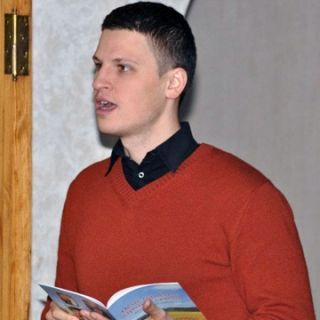
Uncovering the unreached
The evangelical church in Ukraine, where SEND started working soon after the fall of the Soviet Union, is beginning to develop into a missions force. Kyle Eipperle and his wife, Carrie, have served with SEND in Ukraine for more than 16 years — long enough to see the church start sending Ukrainians as cross-cultural workers. Kyle’s work inspires Ukrainian believers and churches to notice and respond to the unexpected Great Commission opportunities that surround them.
Q. What is your ministry?
I work to mobilize the local church on the mission field to pray, send, or serve in missions to unreached people groups — we call this “frontier mobilization.” Part of my ministry has been devoted to ethnographic research on unreached peoples in Eurasia and Central Asia. My research has led me to develop Russian- and Ukrainian-language prayer guides that highlight unreached peoples in the former Soviet Union. The prayer guides contain demographic information, an ethnographic profile, and strategic prayer points for UPGs.
Q. How many guides have you published?
My first prayer guide was produced in 2009. It was a small, Russian-language booklet about the unreached people groups of Ukraine. Since then I have published four additional Russian-language guides and one guide in Ukrainian. We have distributed over 5,000 print versions. The guides also are available as digital files, and have been distributed among churches in Ukraine and Russia. The digital file — in English and in Russian —is also available for download on the Joshua Project web site.
Q. How do you go about researching these guides?
At first, Joshua Project was the main source for my research. Later I found other sources. But English sources lacked crucial ethnographic information about the people groups I was researching. Sometimes there was not even a photograph available of the people group. I then turned to sources in Russian. I have even had the opportunity to interview someone from one of the people groups I am researching.
Q. What have been some of the most fascinating things you’ve discovered in your research?
I’ve discovered people groups that are not mentioned in English-language sources! I have always been fascinated with discovery. Growing up I wanted to become an archaeologist and dig up treasures. In a way, that dream has become a reality. I have uncovered 20 people groups within Russia that have been hidden from Western missionary endeavors.
Q. Why did you decide to research unreached people groups?
As the Ukrainian church began to develop as a missions force, I started researching unreached peoples to learn more about the people and places Ukrainians were going, or could potentially go, as missionaries. I discovered a very diverse ethnic population within the former Soviet Union. I learned that nearly all the people groups in Russia are still unreached, including Russians. I thought up ways to share what I’d learned. Since then, I have made it my goal to find creative ways to inform believers about the needs in Eurasia and Central Asia.
Q. How does your ministry help make disciples among the unreached?
There are people groups that have existed for centuries but have been ignored by Western missionary endeavors. Why has this happened? Well, it is impossible to send a missionary to invisible people. To complete the Great Commission, we must know who are the ethnic people groups of the world.
Q. How are believers using the guides you’ve put together?
Individuals use the prayer guides in their personal prayer times. Small groups are praying for a people group each time they meet. Some churches have adopted an unreached people group or highlight an unreached people group once a month during their worship service.
Q. What kind of feedback have you gotten?
First reactions to the prayer guides range from shock to utter disbelief. A frequent comment I’ve heard from Ukrainians is, “I had no idea these people lived here!” One person who had a surprised first reaction reported back to me a year later that he since has made contact with foreigners in his hometown. The prayer guides have a way of opening our eyes to the people around us. I used to think that Ukraine was home only to ethnic Ukrainians and a small percentage of ethnic Russians. Turns out, Ukraine is a very diverse country. There are more than 130 ethnic people groups that call Ukraine their home.
Q. How is prayer connected to engaging the unreached?
I believe prayer is the key element in bringing the gospel to lost people. In Matthew 9:37-38, Jesus instructs his disciples to pray earnestly for laborers to be sent to the unreached. In Colossians 4:3, Paul called on the church to pray that he would be allowed access to declare the gospel to the unreached. The goal of my research is to inspire Christians to pray strategically for unreached peoples.
More Harvest Heartbeat stories
Mentoring Aigerim — Sometimes, ministering "among" the unreached means sharing a kitchen and letting discipleship naturally develop.
Inspiring prayer for the unreached — A church-planting movement’s foundation rests on prayer — and global workers can help lay that foundation.
Learn more about the unreached
- 'Is Jesus some person living in your village?' — An exploration of what "unreached" means, and what it doesn't mean.
- Engaging the unreached — A short video that explains what we mean by "unreached people group."
- Upward evanglism — Ministry among diaspora Vietnamese ends up also engaging wealthier Taiwanese.
- Inspiring prayer for the unreached — A church-planting movement’s foundation rests on prayer — and global workers can help lay that foundation.
- Exploring the faith she mocked — Building trust in unreached communities can take decades, but SEND is poised to invest more in Ummi.
- SEND offers hundreds of opportunities — long term. mid term and short term — to engage the unreached.
- Find ideas for daily prayer for the unreached.
Additional Posts




